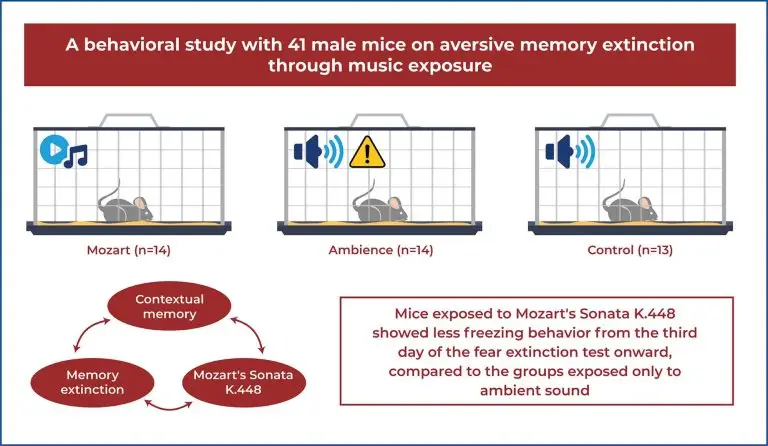einstein (São Paulo). 02/Jul/2025;23:eAO1299.
Investigation of the Mozart sonata effect on contextual memory extinction
DOI: 10.31744/einstein_journal/2025AO1299
Highlights
■ In this study, mice were exposed to music at the intrauterine stage.
■ Music exposure before aversive memory formation enhances neuroplasticity, aiding in extinction.
■ The recall test showed that music exposure had sustained beneficial long-term effects.
ABSTRACT
Objective:
This study aimed to analyze the influence of Mozart’s Sonata K.448 on contextual memory extinction in male mice.
Methods:
Male mice were divided into three groups (G1-Mozart, G2-Ambience, G3-Control). Throughout the project, only the first group was exposed to the sonata at the intrauterine stage. Only Groups 1 and 2 underwent aversive training; subsequently, all groups participated in extinction and recall tests.
Results:
On the first day of extinction, G1’s freezing time was longer than G2’s and G3’s, whilst on the second day it was only longer than G3’s. Finally, on the fifth day, G1’s freezing time was shorter than that of G2. During the second and third days of extinction, G1’s freezing time decreased more than G3’s, whereas during the fourth and fifth day, G1 upheld its freezing time, whereas G2’s extended. During recall, G1 had a longer freezing time than G3. All results were statistically significant (p≤0.05).
Conclusion:
Based on the results, we concluded that male mice exposed to Mozart’s Sonata K.448 showed increased freezing time, suggesting an impact of the music on memory formation. However, they exhibited a linear extinction memory process. This progressive decrease in freezing behavior was not observed in the ambient and Control Groups.
[…]
Keywords: Fear; Memory; Music; Amnesia, retrograde; Mice
110



